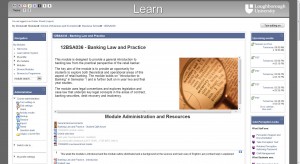What is Learn for?
I was challenged a couple of days ago by an experienced academic colleague who said he had no idea what Learn (Moodle, if you’re reading this outside Loughborough) is actually for.
I was rather taken aback by this as it seemed to me that this should be obvious. But then, I’ve been supporting e-learning in Higher Education continuously for 12 years so for me the Virtual Learning Environment (VLE) is a focus for most of my work. Considering the question more objectively, I have to acknowledge that for some colleagues the purpose of a VLE may be more obscure.
There is a functional description within the ‘Tools for Teaching’ section of this blog at https://blog.lboro.ac.uk/elearning/?page_id=1293 and this provides a condensed version of the message we try to get across within the New Lecturers’ Course and other CPD workshops, such as the ‘Introduction to Online Support’. Support is available to academic colleagues – both technical (via the learn [at] lboro.ac.uk helpdesk) and pedagogic, from the E-learning Officers and Quality Enhancement Officers in the Teaching Centre. This very blog (and the new Teaching and Learning Blog) provide an ever expanding set of case studies and other resources.
In some respects, it seems to me that asking the question “What is the VLE for?” is like asking “What is the teaching room for?” As with teaching rooms, the VLE provides you as the module tutor with an environment that enables a variety of activities to take place. It’s up to you how you use it, as long as your use goes beyond the Minimum Presence agreed by the University Learning and Teaching Committee.
For the last 5 years or so, coinciding with the rise of social media, some experts have been forecasting the demise of the VLE (see, for instance, http://serials.uksg.org/content/55k7732dthrq6gk1/?genre=article&issn=0953-0460&volume=20&issue=1&spage=31 ). But, perhaps because change in HE (and institutional systems in particular) takes longer than in some other domains, there is no sign of this happening anytime soon. For a balanced summary of where we are now with regard to Web 2.0 tools supplanting institutional VLEs, see Stephen Walker’s blog post on the subject.
